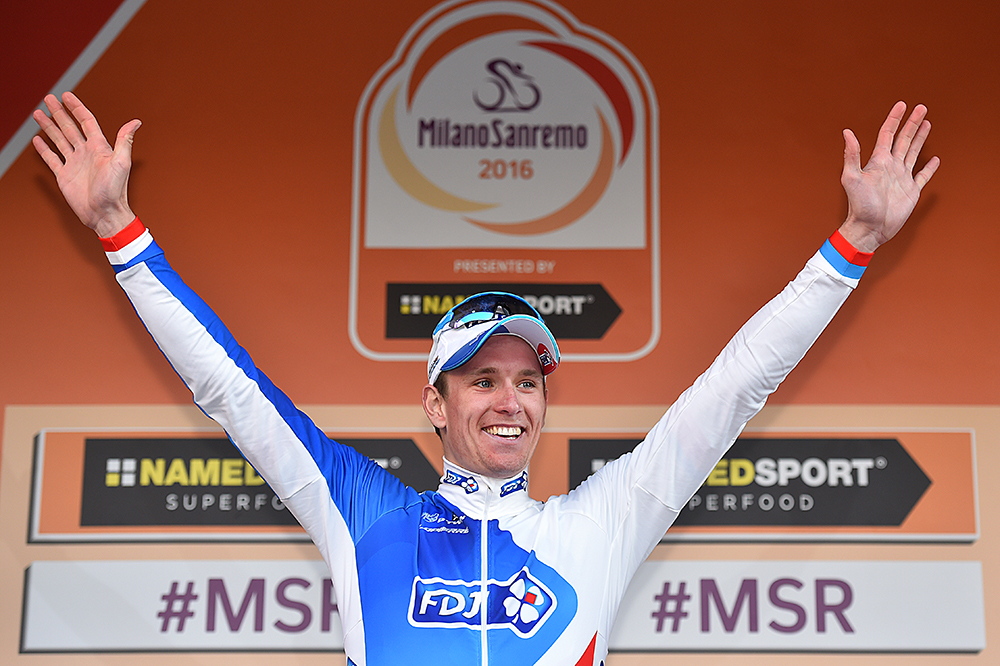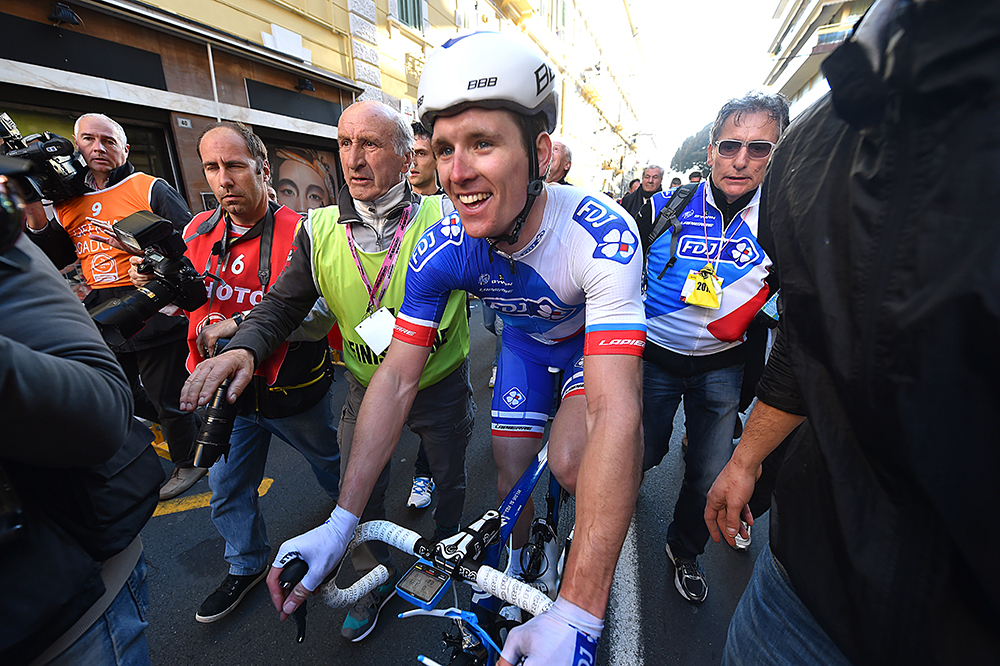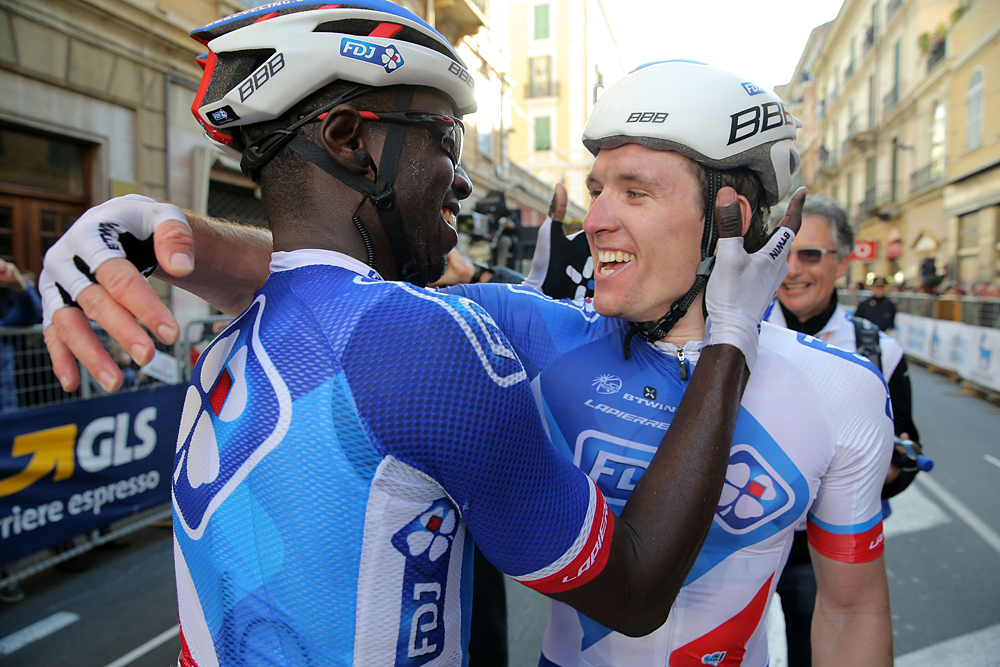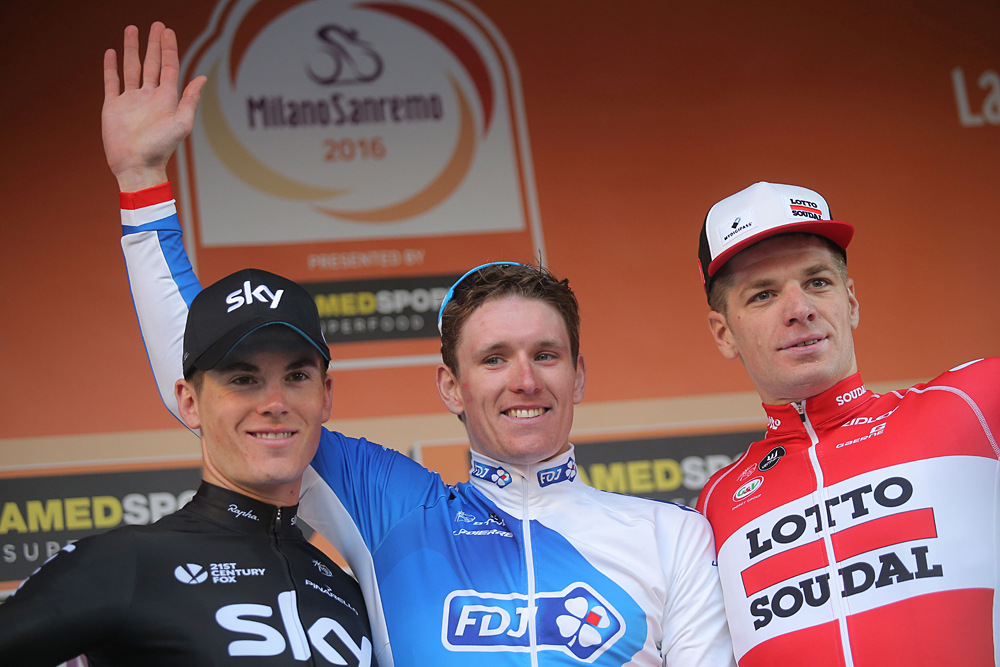Démare: I was ready to throw in the towel in Milan-San Remo - Video
FDJ rider bridges 21-year gap for France




As Arnaud Démare (FDJ) hit the front on the Via Roma and the ‘Arrivo' banner for Milan-San Remo up ahead drew ever closer, a chilling thought suddenly flashed across his mind. "I launched my sprint from distance, just the way I like, but then I started wondering if there was still someone up the road, because I'd lost track of the race," he admitted afterwards.
It was that kind of edition of Milan-San Remo, but at the end of a breathless, crash-strewn finale, Démare had indeed emerged from the tumult as the mildly surprising winner, ahead of Ben Swift (Sky) and Jurgen Roelandts (Lotto Soudal).
Démare was among the riders held up in a crash at the base of the Cipressa, with 25 kilometres remaining, but after a white-knuckle pursuit in the company of William Bonnet, Mathieu Ladagnous and Kevin Reva, the Frenchman found himself back in the front group on the lower slopes of the Poggio.
"After the crash, I was ready to throw in the towel to be honest. I said to myself: ‘It's over.' I thought it was gone. But then my directeur sportif came past in the car and said not to panic because [Michael] Matthews had crashed too and there were more riders chasing back on," Démare said.
"I got back on right at the foot of the Poggio, but I thought I'd used up all my energy but sometimes you just have days where everything smiles on you. A day of grace, so to speak."
The drama at Milan-San Remo is always concentrated in the final kilometres. Here, it was distilled into the very last metres. First, Fernando Gaviria (Etixx-QuickStep) crashed just as the sprint began, disrupting world champion Peter Sagan (Tinkoff), among others, and then Nacer Bouhanni (Cofidis) slipped a chain in the sprint itself, just as he was lined up side by side with Démare.
"I don't know if Gaviria's crash changed anything, but in the end, today the sprint was the way it was," Démare said gnomically. "It's just part of cycling. I mean, I fell before the Cipressa. At Paris-Roubaix the other year, I punctured with 30 kilometres to go. At Flanders I've had chain problems in the past. When everyone is tired at the end of a race like that, there are always mistakes."
The latest race content, interviews, features, reviews and expert buying guides, direct to your inbox!
While both Démare and Bouhanni each claimed stage victories at Paris-Nice last week, the expectation was that if anyone was going to bridge the 21-year gap to Laurent Jalabert, the last French winner on the Via Roma, it would be the Cofidis man.
Instead, Bouhanni had to endure the double disappointment of being foiled by a mechanical problem and then seeing his former teammate and eternal rival Démare carry off the spoils. Démare, incidentally, had abandoned Paris-Nice on stage 4 complaining of a knee injury, though he showed no ill effects on Saturday.
"I think we were in a mano a mano at that point, but I don't know if I'd passed him before his problem or not, I was just focused on chasing down Roelandts," Démare said. "I know you all want to see this as being an Arnaud versus Nacer story but that's not how it is. He's a very good rider with great qualities. People tend to pit us against one another, but I'm not too worried about what he did today or in the future."
Jalabert comparison dismissed
Nor, indeed, was Démare in any way prepared to entertain comparisons with Jalabert, who was, as one reporter pointed out, viewed primarily as a sprinter prior to his dramatic advance in the spring of 1995. This is, one hopes, a different era.
"No, I think winning Milan-San Remo is already enough," Démare said. "But it's superb for French cycling to win this race. There are five Monuments in cycling and now I've won one of them. That's already something very special."
Winner of the under-23 world championships in Copenhagen in 2011, Démare arrived in the professional ranks with a heady reputation, one he confirmed with early wins in his debut season and a fine 2014 campaign that saw him land the French title and shine at Paris-Roubaix.
Démare's 2015 season was a relative disappointment, however, and when he popped up to win the opening road stage at Paris-Nice, it did not go unnoticed that it was his first victory at WorldTour level in more than two and a half years, since a stage of the Eneco Tour in 2013.
"I'm proud to be able to show the public that my work pays off. I've worked a lot without getting the results I might have deserved, but in this early part of 2016, everything is coming off for me," he said.
As befits a native of Beauvais in northern France, the Monument that Démare covets above all others, of course, is Paris-Roubaix. For his next trick, the French public will surely expect Démare, 12th in 2014, to emulate his directeur sportif Frédéric Guesdon and become the first home winner in the Hell of the North since 1997.
Though still only 24 years of age and still digesting this unexpected triumph south of the Alps, Démare was bullish about his prospects on the second Sunday in April.
"This win won't change a lot for me, my ambitions for Paris-Roubaix will be the same. But it might change something for the team," he said. "When I start a race like that I aim to win it. The team is already strong physically, but this win will give everybody a lot of mental strength too."

Barry Ryan was Head of Features at Cyclingnews. He has covered professional cycling since 2010, reporting from the Tour de France, Giro d’Italia and events from Argentina to Japan. His writing has appeared in The Independent, Procycling and Cycling Plus. He is the author of The Ascent: Sean Kelly, Stephen Roche and the Rise of Irish Cycling’s Golden Generation, published by Gill Books.